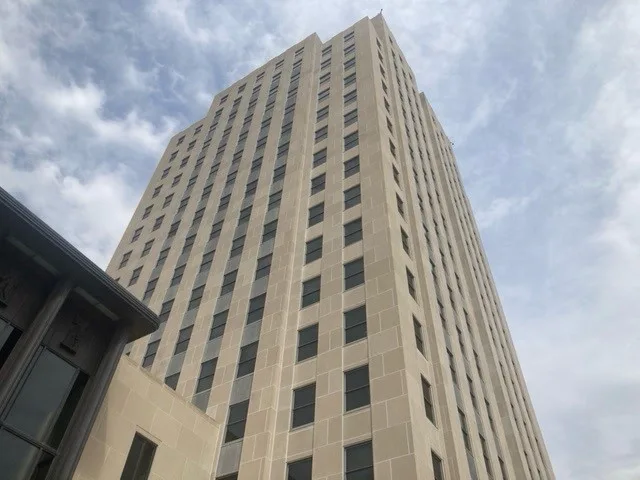

MARY STEURER (North Dakota Monitor)
Plaintiffs in a lawsuit challenging North Dakota’s ban on gender-affirming medical care for minors seek to question two lawmakers about their motivation for sponsoring the legislation.
Attorneys for Gender Justice, the advocacy group representing the plaintiffs, in March sought to order Rep. Bill Tveit, R-Hazen, and Rep. Brandon Prichard, R-Bismarck, to appear for depositions on April 5.
Tveit was the primary sponsor of the bill during the 2023 session, while Prichard was a co-sponsor.
Deputy Solicitor General Katie Carpenter on Aprl 4 responded on behalf of Tveit and Prichard with a motion to quash the subpoenas, arguing the lawmakers would be required to testify on “important privilege and public policy concerns” that are protected by “speech or debate” clauses in the U.S. and North Dakota constitutions, as well as other state laws.
Generally speaking, “speech or debate” clauses protect legislators from being sued or criminally prosecuted for things they say during legislative proceedings.
Carpenter also claimed that the subpoenas were “unduly burdensome” and that Gender Justice didn’t give the lawmakers enough notice to comply with the order.
In a reply filed Thursday, the plaintiffs asked the court to deny the motion, disputing the deputy solicitor general’s interpretation of the protections as overbroad.
The plaintiffs argue the lawmakers can’t be shielded from the subpoenas because the plaintiff’s attorneys only plan on questioning Tveit and Prichard about social media posts the lawmakers made about the ban — not statements made in the course of official legislative business.
“Plaintiffs seek to question the Representatives about their public statements made on social media regarding the Health Care Ban and bias against transgender and LGBTQ people generally and to authenticate such posts,” the reply states.
The plaintiffs quoted multiple social media posts by Prichard containing anti-LGBTQ views — including one Jan. 2 post on X, formerly Twitter, where the lawmaker wrote “The LGBTQ agenda is evil and bad for North Dakota” and asked, “What even is a queer?”
The plaintiffs also countered that the Attorney General’s Office never reached out to them about the subpoenas and that they would have been open to rescheduling the hearings had the state asked.
Court records indicate that Prichard was served on March 26, but that attempts to serve Tveit were unsuccessful.
Prichard told the North Dakota Monitor he believes he’s being subpoenaed because he spoke in favor of the legislation on the House floor and was a “boisterous” supporter of it during committee discussions.
Prichard said he would prefer not to be deposed because he believes the Gender Justice attorneys are seeking a “gotcha” moment that would help their case. If the court orders him to comply with the subpoena, he will, Prichard said.
Tveit did not respond to requests for comment by publication.
The case is overseen by South Central District Court Judge Jackson Lofgren.
The legislation at the center of the legal battle was signed into law by Gov. Doug Burgum in April 2023.
A group of families and doctors filed suit against the state in September, claiming the law is unconstitutional. The plaintiffs have argued in court filings that the law discriminates against transgender adolescents by withholding treatments that are still available to other kids for other medical reasons. They also claim the policy violates parents’ right to make medical decisions for their children.
Attorneys for the state have said previously that the law, which was adopted by North Dakota’s Republican-dominated Legislature with more than two-thirds support from lawmakers, should stay in place because it protects children.
The policy makes it a class A misdemeanor to administer medications, including puberty blockers and hormone therapy, to children as gender-affirming care.
Providers convicted of doing so could face up to 360 days in jail, fines of up to $3,000 or both.
The new law also makes it a class B felony to perform transition-related surgery on a minor. Anyone convicted of violating this provision of the legislation could face up to 10 years in prison and a maximum $20,000 fine. In hearings on the bill, health care professionals testified that transition-related surgeries are not performed on minors in North Dakota.
The ban states minors who were receiving gender-affirming care before the legislation took effect may continue receiving treatment, though the plaintiffs have said the exemption is too vague to have legal teeth. As a result, North Dakota doctors are not providing gender affirming care to any minors, even those who were pre-existing patients, the plaintiffs say.
Both parties are waiting for Lofgren to decide whether to suspend enforcement of the law while the case proceeds.
The plaintiffs motioned for a preliminary injunction on the legislation in 2023, arguing that the law poses irreparable harm to children who need gender-affirming care but can no longer access it.
Witnesses testified for and against the motion at a January hearing in Bismarck.